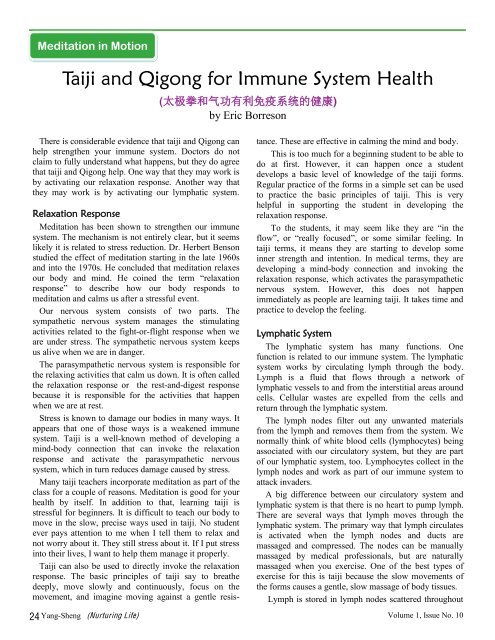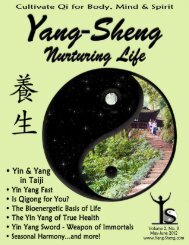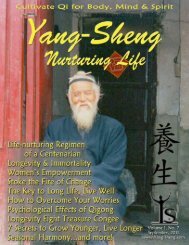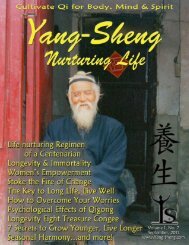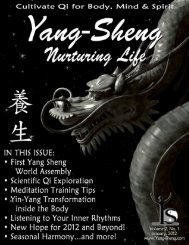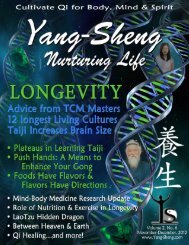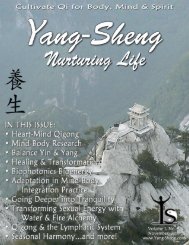Download the December issue of Yang-Sheng as
Download the December issue of Yang-Sheng as
Download the December issue of Yang-Sheng as
You also want an ePaper? Increase the reach of your titles
YUMPU automatically turns print PDFs into web optimized ePapers that Google loves.
Meditation in Motion<br />
Taiji and Qigong for Immune System Health<br />
There is considerable evidence that taiji and Qigong can<br />
help streng<strong>the</strong>n your immune system. Doctors do not<br />
claim to fully understand what happens, but <strong>the</strong>y do agree<br />
that taiji and Qigong help. One way that <strong>the</strong>y may work is<br />
by activating our relaxation response. Ano<strong>the</strong>r way that<br />
<strong>the</strong>y may work is by activating our lymphatic system.<br />
Relaxation Response<br />
Meditation h<strong>as</strong> been shown to streng<strong>the</strong>n our immune<br />
system. The mechanism is not entirely clear, but it seems<br />
likely it is related to stress reduction. Dr. Herbert Benson<br />
studied <strong>the</strong> effect <strong>of</strong> meditation starting in <strong>the</strong> late 1960s<br />
and into <strong>the</strong> 1970s. He concluded that meditation relaxes<br />
our body and mind. He coined <strong>the</strong> term “relaxation<br />
response” to describe how our body responds to<br />
meditation and calms us after a stressful event.<br />
Our nervous system consists <strong>of</strong> two parts. The<br />
sympa<strong>the</strong>tic nervous system manages <strong>the</strong> stimulating<br />
activities related to <strong>the</strong> fight-or-flight response when we<br />
are under stress. The sympa<strong>the</strong>tic nervous system keeps<br />
us alive when we are in danger.<br />
The par<strong>as</strong>ympa<strong>the</strong>tic nervous system is responsible for<br />
<strong>the</strong> relaxing activities that calm us down. It is <strong>of</strong>ten called<br />
<strong>the</strong> relaxation response or <strong>the</strong> rest-and-digest response<br />
because it is responsible for <strong>the</strong> activities that happen<br />
when we are at rest.<br />
Stress is known to damage our bodies in many ways. It<br />
appears that one <strong>of</strong> those ways is a weakened immune<br />
system. Taiji is a well-known method <strong>of</strong> developing a<br />
mind-body connection that can invoke <strong>the</strong> relaxation<br />
response and activate <strong>the</strong> par<strong>as</strong>ympa<strong>the</strong>tic nervous<br />
system, which in turn reduces damage caused by stress.<br />
Many taiji teachers incorporate meditation <strong>as</strong> part <strong>of</strong> <strong>the</strong><br />
cl<strong>as</strong>s for a couple <strong>of</strong> re<strong>as</strong>ons. Meditation is good for your<br />
health by itself. In addition to that, learning taiji is<br />
stressful for beginners. It is difficult to teach our body to<br />
move in <strong>the</strong> slow, precise ways used in taiji. No student<br />
ever pays attention to me when I tell <strong>the</strong>m to relax and<br />
not worry about it. They still stress about it. If I put stress<br />
into <strong>the</strong>ir lives, I want to help <strong>the</strong>m manage it properly.<br />
Taiji can also be used to directly invoke <strong>the</strong> relaxation<br />
response. The b<strong>as</strong>ic principles <strong>of</strong> taiji say to brea<strong>the</strong><br />
deeply, move slowly and continuously, focus on <strong>the</strong><br />
movement, and imagine moving against a gentle resis-<br />
(太极拳和气功有利免疫系统的健康)<br />
by Eric Borreson<br />
tance. These are effective in calming <strong>the</strong> mind and body.<br />
This is too much for a beginning student to be able to<br />
do at first. However, it can happen once a student<br />
develops a b<strong>as</strong>ic level <strong>of</strong> knowledge <strong>of</strong> <strong>the</strong> taiji forms.<br />
Regular practice <strong>of</strong> <strong>the</strong> forms in a simple set can be used<br />
to practice <strong>the</strong> b<strong>as</strong>ic principles <strong>of</strong> taiji. This is very<br />
helpful in supporting <strong>the</strong> student in developing <strong>the</strong><br />
relaxation response.<br />
To <strong>the</strong> students, it may seem like <strong>the</strong>y are “in <strong>the</strong><br />
flow”, or “really focused”, or some similar feeling. In<br />
taiji terms, it means <strong>the</strong>y are starting to develop some<br />
inner strength and intention. In medical terms, <strong>the</strong>y are<br />
developing a mind-body connection and invoking <strong>the</strong><br />
relaxation response, which activates <strong>the</strong> par<strong>as</strong>ympa<strong>the</strong>tic<br />
nervous system. However, this does not happen<br />
immediately <strong>as</strong> people are learning taiji. It takes time and<br />
practice to develop <strong>the</strong> feeling.<br />
Lymphatic System<br />
The lymphatic system h<strong>as</strong> many functions. One<br />
function is related to our immune system. The lymphatic<br />
system works by circulating lymph through <strong>the</strong> body.<br />
Lymph is a fluid that flows through a network <strong>of</strong><br />
lymphatic vessels to and from <strong>the</strong> interstitial are<strong>as</strong> around<br />
cells. Cellular w<strong>as</strong>tes are expelled from <strong>the</strong> cells and<br />
return through <strong>the</strong> lymphatic system.<br />
The lymph nodes filter out any unwanted materials<br />
from <strong>the</strong> lymph and removes <strong>the</strong>m from <strong>the</strong> system. We<br />
normally think <strong>of</strong> white blood cells (lymphocytes) being<br />
<strong>as</strong>sociated with our circulatory system, but <strong>the</strong>y are part<br />
<strong>of</strong> our lymphatic system, too. Lymphocytes collect in <strong>the</strong><br />
lymph nodes and work <strong>as</strong> part <strong>of</strong> our immune system to<br />
attack invaders.<br />
A big difference between our circulatory system and<br />
lymphatic system is that <strong>the</strong>re is no heart to pump lymph.<br />
There are several ways that lymph moves through <strong>the</strong><br />
lymphatic system. The primary way that lymph circulates<br />
is activated when <strong>the</strong> lymph nodes and ducts are<br />
m<strong>as</strong>saged and compressed. The nodes can be manually<br />
m<strong>as</strong>saged by medical pr<strong>of</strong>essionals, but are naturally<br />
m<strong>as</strong>saged when you exercise. One <strong>of</strong> <strong>the</strong> best types <strong>of</strong><br />
exercise for this is taiji because <strong>the</strong> slow movements <strong>of</strong><br />
<strong>the</strong> forms causes a gentle, slow m<strong>as</strong>sage <strong>of</strong> body t<strong>issue</strong>s.<br />
Lymph is stored in lymph nodes scattered throughout<br />
24 <strong>Yang</strong>-<strong>Sheng</strong> (Nurturing Life) Volume 1, Issue No. 10


